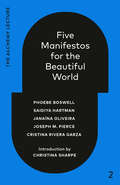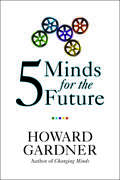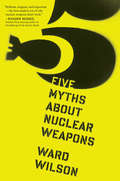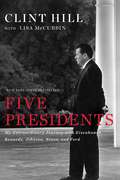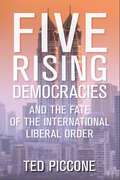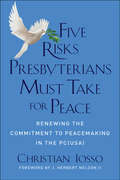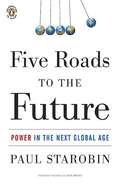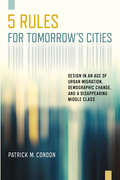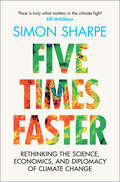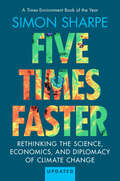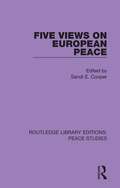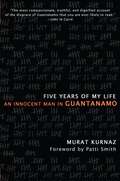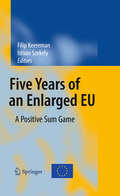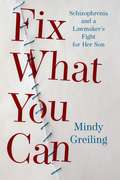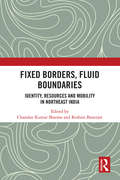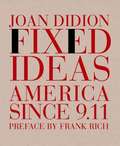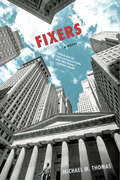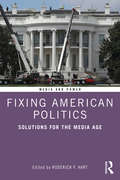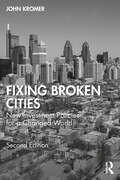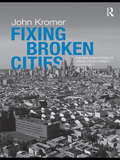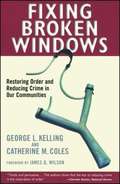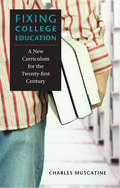- Table View
- List View
Five Manifestos for the Beautiful World: The Alchemy Lecture 2023 (The Alchemy Lecture)
by Saidiya Hartman Cristina Rivera Garza Joseph M. Pierce Phoebe Boswell Janaína OliveiraFive Alchemists. One book. A constellation of ideas.The second annual Alchemy Lecture was presented in November 2023 at York University to a sold out in-person audience and nearly one thousand live online viewers. Moderated by Dr. Christina Sharpe, the Alchemists—agile thinkers and practitioners working across a range of disciplines and geographies—convened to discuss their radical visions of the beautiful world, and the manifestos that may help to guide us there. Their treatises have been captured and luminously expanded in the pages of this book.Cherokee Nation citizen and professor Joseph M. Pierce asserts that &“[f]or this decolonial future to become possible, the guiding force must no longer be capital but relations.&” Informed by her practice of &“curation as care,&” Brazilian film curator Janaína Oliveira evokes music and movement as a means toward this relationality: &“it's almost by falling that you live. . . . The beautiful world dances the stumbles. The beautiful world dances dancing.&” Kenyan-British visual artist Phoebe Boswell uses the space of a virtual gallery to ask, &“If we burn down the institution, what happens next? Do we trust ourselves to know?&” and gestures toward the possibility of this &“as yet unlived, unexperienced thing.&” Professor and MacArthur fellow Saidiya Hartman asks us to consider our capacity to burn, stating that &“[P]ragmatism yields a profound tolerance of the unlivable.&” And Mexican-American author Cristina Rivera Garza gives us the language of the future in the subjunctive, which &“lays the groundwork for the irruption. . . . The subjunctive is the smuggler who crosses the border of the future bearing unknown cargo.&”Each Alchemist is intimately concerned with the shape of this cargo and our ability to bear its weight, together. Through these expansive, transformative essays, new ways of being are threaded and proposed, illuminating our path towards this possible beautiful world.
Five Minds for the Future
by Howard GardnerWe live in a time of relentless change. The only thing that?s certain is that new challenges and opportunities will emerge that are virtually unimaginable today. How can we know which skills will be required to succeed?In Five Minds for the Future, bestselling author Howard Gardner shows how we will each need to master "five minds" that the fast-paced future will demand:· The disciplined mind, to learn at least one profession, as well as the major thinking (science, math, history, etc.) behind it· The synthesizing mind, to organize the massive amounts of information and communicate effectively to others· The creating mind, to revel in unasked questions - and uncover new phenomena and insightful apt answers· The respectful mind, to appreciate the differences between human beings - and understand and work with all persons· The ethical mind, to fulfill one's responsibilities as both a worker and a citizenWithout these "minds," we risk being overwhelmed by information, unable to succeed in the workplace, and incapable of the judgment needed to thrive both personally and professionally.Complete with a substantial new introduction, Five Minds for the Future provides valuable tools for those looking ahead to the next generation of leaders - and for all of us striving to excel in a complex world.Howard Gardner-cited by Foreign Policy magazine as one of the one hundred most influential public intellectuals in the world, and a MacArthur Fellowship recipient-is the Hobbs Professor of Cognition and Education at the Harvard Graduate School of Education.
Five Myths About Nuclear Weapons
by Ward WilsonAn explosive rethinking of the power and purpose of nuclear weapons—and a call for radical action Nuclear weapons have always been a serious but seemingly insoluble problem: while they&’re obviously dangerous, they are also, apparently, necessary. This groundbreaking study shows why five central arguments promoting nuclear weapons are, in essence, myths. It is a myth: • that nuclear weapons necessarily shock and awe opponents, including Japan at the end of World War II • that nuclear deterrence is reliable in a crisis • that destruction wins wars • that the bomb has kept the peace for sixty-five years • and that we can&’t put the nuclear genie back in the bottle Drawing on new information and the latest historical research, Wilson poses a fundamental challenge to the myths on which nuclear weapons policy is currently built. Using pragmatic arguments and an unemotional, clear-eyed insistence on the truth, he arrives at a surprising conclusion: nuclear weapons are enormously dangerous, but don&’t appear to be terribly useful. In that case, he asks, why would we want to keep them? This book will be widely read and discussed by everyone who cares about war, peace, foreign policy, and security in the twenty-first century.
Five Presidents: My Extraordinary Journey with Eisenhower, Kennedy, Johnson, Nixon, and Ford
by Clint Hill Lisa Mccubbin<P>A rare and fascinating portrait of the American presidency from the #1 New York Times bestselling author of Mrs. Kennedy and Me and Five Days in November. <P>Secret Service agent Clint Hill brings history intimately and vividly to life as he reflects on his seventeen years protecting the most powerful office in the nation. <P>Hill walked alongside Presidents Dwight D. Eisenhower, John F. Kennedy, Lyndon B. Johnson, Richard M. Nixon, and Gerald R. Ford, seeing them through a long, tumultuous era--the Cold War; the Cuban Missile Crisis; the assassinations of John F. Kennedy, Martin Luther King, Jr., and Robert F. Kennedy; the Vietnam War; Watergate; and the resignations of Spiro Agnew and Richard M. Nixon. <P>Some of his stunning, never-before-revealed anecdotes include: -Eisenhower's reaction at Russian Prime Minister Khrushchev's refusal to talk following the U-2 incident -The torture of watching himself in the Zapruder film in a Secret Service training -Johnson's virtual imprisonment in the White House during violent anti-Vietnam protests -His decision to place White House files under protection after a midnight phone call about Watergate -The challenges of protecting Ford after he pardoned Nixon <P>With a unique insider's perspective, Hill sheds new light on the character and personality of these five presidents, revealing their humanity in the face of grave decisions. <P><b>A New York Times Bestseller</b>
Five Rising Democracies
by Ted PicconeShifting power balances in the world are shaking the foundations of the liberal international order and revealing new fault lines at the intersection of human rights and international security. Will these new global trends help or hinder the world's long struggle for human rights and democracy? The answer depends on the role of five rising democracies-India, Brazil, South Africa, Turkey, and Indonesia-as both examples and supporters of liberal ideas and practices.Ted Piccone analyzes the transitions of these five democracies as their stars rise on the international stage. While they offer important and mainly positive examples of the compatibility of political liberties, economic growth, and human development, their foreign policies swing between interest-based strategic autonomy and a principled concern for democratic progress and human rights. In a multipolar world, the fate of the liberal international order depends on how they reconcile these tendencies.
Five Risks Presbyterians Must Take for Peace: Renewing The Commitment To Peacemaking In The Pc(usa)
by Christian IossoBelieving peacemaking to be an inherent part of discipleship, Presbyterians have taken many valiant stands for peace throughout our history. However, changing global realities, political and military actions, and new weapons of war have made the world less safe than ever. The church must reconsider how to be faithful peacemakers in this changing reality. <P><P>The Presbyterian Church recently spent six years reflecting on peacemaking. Building on past policy documents, people at all levels of the church studied and discussed what peacemaking policies needed to be modified given the world context today. The 2016 PC(USA) General Assembly affirmed five affirmations the church must make to fulfill its peacemaking calling. Those affirmations become risks when truly taken, because their message collides with the demands for continued sacrifice by the powers that be. In this timely resource, author Christian Iosso explains what the five risks are, how they differ from previous positions, and what taking each risk might look like today. <P><P>Ideal for individual or group study, this important resource includes questions for reflection and discussion.
Five Roads to the Future: Power in the Next Global Age
by Paul StarobinFarsighted and fascinating predictions for a new world order <P> Veteran international correspondent Paul Starobin masterfully mixes fresh reportage with rigorous historical analysis to envision a world in which the United States is no longer the dominant superpower. Following an insightful study of America's global ascendency, Starobin provides the reasons for America's waning influence and explores five possible paths for the future, each of which is already in the making: A global chaos that could be dark or happy; a multipolar order of nation-states; a global Chinese imperium; an age of global city-states; or a universal civilization leading to world government. Starobin's tone is somber but in the end hopeful-the world after America need not be a disaster for America, and may even be liberating.
Five Rules for Tomorrow's Cities: Design in an Age of Urban Migration, Demographic Change, and a Disappearing Middle Class
by Patrick M. CondonAs urban designers respond to the critical issue of climate change they must also address three cresting cultural waves: the worldwide rural-to-urban migration; the collapse of global fertility rates; and the disappearance of the middle class. In Five Rules for Tomorrow's Cities, planning and design expert Patrick Condon offers five rules to help urban designers assimilate these interconnected changes into their work: (1) See the City as a System; (2) Recognize Patterns in the Urban Environment; (3) Apply Lighter, Greener, Smarter Infrastructure; (4) Strengthen Social and Economic Urban Resilience; and (5) Adapt to Shifts in Jobs, Retail, and Wages. Five Rules for Tomorrow's Cities provides grounded and financially feasible design examples for tomorrow's sustainable cities, and the design tools needed to achieve them.
Five Things to Know about the Australian Constitution
by Helen IrvingIn this excellent new book, Helen Irving delves into the mystery that is the Australian constitution by discussing the major national debates of recent years. Many people want to understand and take part in the debate about constitutional issues but they face a significant hurdle: the constitution is almost unreadable. It does not mean what it says, and nor does it say what it means. There are many myths in circulation about what the constitution says and as many assumptions about what it does. Helen Irving, one of this country's foremost constitutional experts, puts various constitutional confusions to rest, and invites a general audience into an understanding of the issues that were once reserved for experts.
Five Times Faster: Rethinking the Science, Economics, and Diplomacy of Climate Change
by Simon SharpeWe need to act five times faster to avoid dangerous climate change. As Greenland melts, Australia burns, and greenhouse gas emissions continue to rise, we think we know who the villains are: oil companies, consumerism, weak political leaders. But what if the real blocks to progress are the ideas and institutions that are supposed to be helping us? Five Times Faster is an inside story from Simon Sharpe, who has spent ten years at the forefront of climate change policy and diplomacy. In our fight to avoid dangerous climate change, science is pulling its punches, diplomacy is picking the wrong battles, and economics has been fighting for the other side. This provocative and engaging book sets out how we should rethink our strategies and reorganise our efforts in the fields of science, economics, and diplomacy, so that we can act fast enough to stay safe.
Five Times Faster: Rethinking the Science, Economics, and Diplomacy of Climate Change – Updated Edition
by Simon SharpeWe need to act five times faster to avoid dangerous climate change. This is an inside story from Simon Sharpe, who has spent ten years at the forefront of climate change policy and diplomacy. In our fight to avoid dangerous climate change, science is pulling its punches, diplomacy is picking the wrong battles, and economics has been fighting for the other side. This provocative and engaging book sets out how we should rethink our strategies and reorganise our efforts in the fields of science, economics, and diplomacy, so that we can act fast enough to stay safe. This edition has been brought up-to-date throughout, and includes a new chapter on how international cooperation on climate change can be reconciled with economic and geopolitical competition. It also includes a response to the question the book has most often provoked: 'How can I help?'
Five Views on European Peace (Routledge Library Editions: Peace Studies)
by Sandi E. CooperThe years of the French Revolution and the Napoleonic conquest of Europe revealed an undeniable conjunction between international war and internal revolution, a combination which both repelled and attracted contemporary and successive generations. Represented in this volume, originally published with a new introduction in 1972, are excerpts from five eminent Europeans who lived, wrote and worked in the shadow of that awesome reality. Though their attitudes toward war and revolution differ sharply, the observations of Saint-Simon, Gentz Hugo, Mazzini and Considerant reflect the responses of a wide range of committed and thoughtful Europeans.
Five Years After: European Union Membership and Macro-Financial Stability in the New Member States
by Wim Fonteyne Martin ČihákA report from the International Monetary Fund.
Five Years of My Life: An Innocent Man in Guantanamo
by Murat KurnazIn October 2001, nineteen-year-old Murat Kurnaz traveled to Pakistan to visit a madrassa. During a security check a few weeks after his arrival, he was arrested without explanation and for a bounty of $3,000, the Pakistani police sold him to U.S. forces. He was first taken to Kandahar, Afghanistan, where he was severely mistreated, and then two months later he was flown to Guantanamo as Prisoner #61. For more than 1,600 days, he was tortured and lived through hell. He was kept in a cage and endured daily interrogations, solitary confinement, and sleep deprivation. Finally, in August 2006, Kurnaz was released, with acknowledgment of his innocence. Told with lucidity, accuracy, and wisdom, Kurnaz's story is both sobering and poignant--an important testimony about our turbulent times when innocent people get caught in the crossfire of the war on terrorism.
Five Years of an Enlarged EU
by Filip Keereman Istvan SzekelyThis book analyzes the economic performance of the EU in the first five years after its largest expansion in 2004. Accession and integration were expected to foster growth and convergence among the new Member States through intensified trade, foreign direct investment, financial deepening and the adoption of the EU's institutional framework. With the benefit of five years experience, this book brings together experts from academia and think-tanks to assess the driving forces of economic growth and real convergence. The question whether the EU has made a difference in terms of growth is studied thoroughly from various angles, including that of country-specific and sector-specific analysis. It is shown that while the enlargement has been a success story overall, growth and catching-up cannot be taken for granted and the importance of economic policy remains undiminished.
Fix What You Can: Schizophrenia and a Lawmaker's Fight for Her Son
by Mindy GreilingOne mother&’s fight to support her son and change a broken system In his early twenties, Mindy Greiling&’s son, Jim, was diagnosed with schizoaffective disorder after experiencing delusions that demanded he kill his mother. At the time, and for more than a decade after, Greiling was a Minnesota state legislator who struggled, along with her husband, to navigate and improve the state&’s inadequate mental health system. Fix What You Can is an illuminating and frank account of caring for a person with a mental illness, told by a parent and advocate. Greiling describes challenges shared by many families, ranging from the practical (medication compliance, housing, employment) to the heartbreaking—suicide attempts, victimization, and illicit drug use. Greiling confronts the reality that some people with serious mental illness may be dangerous and reminds us that medication works—if taken. The book chronicles her efforts to pass legislation to address problems in the mental health system, including obstacles to parental access to information and insufficient funding for care and research. It also recounts Greiling&’s painful memories of her grandmother, who was confined in an institution for twenty-three years—recollections that strengthen her determination that Jim&’s treatment be more humane. Written with her son&’s cooperation, Fix What You Can offers hard-won perspective, practical advice, and useful resources through a brave and personal story that takes the long view of what success means when coping with mental illness.
Fixed Borders, Fluid Boundaries: Identity, Resources and Mobility in Northeast India
by Reshmi Banerjee Chandan Kumar SharmaThis book provides an understanding of the challenges in Northeast India in terms of the nature of flows and ruptures in the daily lives of people. It brings together multiple and interconnected issues of identity, development, environment, migration, land alienation and policy impacts to the forefront. Northeast India’s history is affected both by internal dynamic processes, as are its linkages with adjoining countries, marked by a fluid movement of people and goods across porous borders. The book explores how the region has emerged as a resource frontier for the global markets, yet its resource mobilization has led to disparity within the region. The volume discusses key themes concerning the region such as the processes of development and people’s resistance; underdevelopment in the peripheral areas; resource flow and conflict; community response and local agency; state and customary practices; politics of land and citizenship; development-induced dispossession; human mobility, immigration and conflict; the notion of "outsiders"; inter-state border conflict; and spatial connections. Rich in empirical data, the volume will be relevant and useful for students and researchers of development studies, Northeast India studies, sociology, political science, border and migration studies, public policy, peace and conflict studies, as well as practitioners and policymakers.
Fixed Ideas: America Since 9.11
by Joan DidionAuthor describes how, since September 11, 2001, there has been a determined effort by the administration to promote an imperial America, a "New Unilateralism" and how, in many parts of America, there is now a disconnect between the government and its citizens.
Fixers
by Michael M. ThomasFor anyone who's wondered why the money men who caused the 2008 banking crisis ended up running U.S. economic policy, a novel that seems too true to be fiction . . . On a winter's night in 2007, a well-heeled "cultural consultant" named Chauncey Suydam gets a call from the head of the world's most powerful investment bank, who says a financial crisis is brewing, but he has a plan to insulate Wall Street from the fallout--and keep people such as himself out of jail. His mission for Chauncey is simple: to help funnel millions of dollars to a certain presidential candidate preaching hope and change, in exchange for a few Wall Street-friendly names in the resultant administration. Yet as Chauncey wends his way amongst the nation's political elite, he sees with greater clarity than ever how decisions really get made--on Wall Street and in Washington. And as the magnitude of the fix he's perpetrating begins to sink in, he starts to have second thoughts . . . But is it too late? At once shocking and all too plausible, Fixers is a riveting political thriller by a master observer of finance and politics that--despite being fiction--offers a frighteningly reasonable explanation of what really might have happened in 2008.From the Hardcover edition.
Fixing American Politics: Solutions for the Media Age (Media and Power)
by Roderick P. HartFixing American Politics: Solutions for the Media Age brings together original chapters from 34 noted scholars from two disciplines – political science and communication – asked to identify the most pressing problems facing the American people and how they can be solved. Authors address the questions succinctly and directly, with their favored solutions featured in chapter titles that exhort and inspire. The book gives the reader much to think about and debate. Should news outlets be funded with public money rather than by private enterprise? Are the new social media a boon or a bane to political elections? Is the American past dead, or is it living once again? Do churchgoers and environmentalists have anything to discuss? Is the FCC doing its job? Can political ads be made less toxic? Should Fox News be "cancelled?" Should cancel cultures be cancelled? Can we become more civil to one another and, if so, how? Fixing American Politics poses all the best questions … and offers some concrete answers as well. This book is perfect for students, citizens, the media, and anyone concerned with contemporary challenges to civic life and discourse today.
Fixing Broken Cities: New Investment Policies for a Changed World
by John KromerFixing Broken Cities explores the planning, execution, and impact of urban repopulation and investment strategies that were launched in the wake of two crises: late twentieth-century economic disinvestment and the outbreak of the COVID-19 pandemic. Because past practices could no longer serve as a reliable guide to future outcomes in this uncertain environment, any new initiatives had to involve a significant level of risk-taking. Based on the author’s experience as a policymaker and practitioner, this book provides detailed insights into the origins and outcomes of these high-risk strategies, along with an explanation of why they succeeded or failed. This new edition examines policy initiatives from a fresh perspective, based on an awareness that (1) real estate ventures are best evaluated over the long term, rather than shortly after the completion of construction activity; (2) policies that had guided the allocation of public-sector resources during past decades of urban disinvestment need to be reconsidered in light of the economic resurgence that many American cities are now experiencing; and (3) the places described in this book are representative of other municipalities, of all kinds, where the pandemic has led to a fundamental rethinking of the relationship between home and workplace. A key theme of the book is equitable development, the question of who should benefit from the allocation of scarce public capital, and what investment policies are most likely to support this principle over the long term. The author provides realistic guidance about pursuing the best opportunities for improvement in highly disadvantaged, resource-starved urban areas, with reference to several key issues that are pressing concerns for members of urban communities: enlivening downtown and neighborhood commercial areas, stabilizing and strengthening residential communities, eliminating industrial-age blight, and providing quality public education options. This new edition will be of great use to planning, housing and community development professionals, both regionally and nationally, as well as to students on Urban Politics and Planning courses.
Fixing Broken Cities: The Implementation of Urban Development Strategies
by John KromerThrough the insightful lens of an experienced practitioner, this book describes the origin, execution, and impact of urban repopulation strategies—initiatives designed to attract residents, businesses, jobs, shoppers, and visitors to places that had undergone decades of decline and abandonment. The central question throughout the strategies explored in the book is who should benefit? Who should benefit from the allocation of scarce public capital? Who should enjoy the social benefits of urban development? And who will populate redeveloped areas? Kromer provides realistic guidance about how to move forward with strategic choices that have to be made in pursuing the best opportunities available within highly disadvantaged, resource-starved urban areas. Each of the cases presents strategies that are strongly influenced by geography, economics, politics, and individual leadership, but they address key issues that are major concerns everywhere: enlivening downtowns, stabilizing and strengthening neighborhoods, eliminating industrial-age blight, and providing quality public education options.
Fixing Broken Windows: Restoring Order and Reducing Crime in Our Communities
by George L. Kelling Catherine M. ColesBased on a groundbreaking theory of crime prevention, this practical and empowering book shows how citizens, business owners, and police can work together to ensure the safety of their communities. George Kelling, one of America’s leading criminologists, has proven the success of his method across the country, from the New York City subways to the public parks of Seattle. Here, Kelling and urban anthropologist and lawyer Catherine Coles demonstrate that by controlling disorderly behavior in public spaces, we can create an environment where serious crime cannot flourish, and they explain how to adapt these effective methods for use in our own homes and communities.
Fixing College Education: A New Curriculum for the Twenty-first Century
by Charles MuscatineSince his early days at the University of California, Berkeley, when he was fired for refusing to sign a loyalty oath during the Red Scare, Charles Muscatine has been a dedicated teacher and higher education reformer. Upon his reinstatement at Berkeley, he founded "Strawberry Creek College," a six-year experiment using full professors and small classes to teach lower-division students. Drawing on this belief in undergraduate teaching, Muscatine's new book now offers a radical new design for American college education.Muscatine begins with the observation that the mediocre undergraduate curriculum offered by most colleges and universities today is based on outdated ideas of what should be taught and what constitutes good teaching. Although Muscatine is himself a well-established research scholar, he contends that the publish-or-perish "research religion" of college and university faculties has seriously damaged undergraduate education. He offers a clear distinction between publishable research and the scholarship necessary for good teaching. Furthermore, he recommends major changes in the education of professors, including reconsidering both the requirement of the book-length dissertation and the current organization of graduate departments. Fixing College Education predicts new roles for students and faculty, redefines educational breadth and depth, and calls for deeper assessment of learning and teaching. Muscatine highlights the outstanding colleges and universities, including Harvard, Boston University's University Professor's Program, Evergreen State College, and Fairhaven College at Western Washington University, that have already remade their curricula successfully or adopted features like the ones he proposes. Muscatine argues that the new curriculum is better able than the old to produce good scholars and good citizens for the twenty-first century.
Fixing Drugs
by Sue PryceIn this unique and engaging book, Sue Pryce tackles the major issues surrounding drug policy. Why do governments persist with prohibition policies, despite their proven inefficacy? Why are some drugs criminalized, and some not? And why does society care about drug use at all? Pryce guides us through drug policy around the world.
